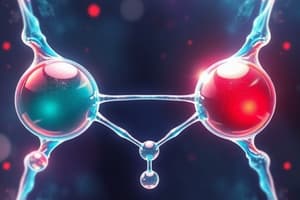Podcast
Questions and Answers
What is the correct order of priority for functional groups in a molecule?
What is the correct order of priority for functional groups in a molecule?
- H(1) > C(6) > N(7) > F(9)
- N(7) > F(9) > C(6) > H(1)
- F(9) > N(7) > C(6) > H(1) (correct)
- C(6) > N(7) > F(9) > H(1)
What is the term for molecules with two or more chiral carbons that exist as non-mirror images of each other?
What is the term for molecules with two or more chiral carbons that exist as non-mirror images of each other?
- Mesomers
- Enantiomers
- Stereoisomers
- Diastereomers (correct)
What is the characteristic of a good leaving group in a substitution reaction?
What is the characteristic of a good leaving group in a substitution reaction?
- It forms a stable anion (correct)
- It is a strong electron donor
- It is the conjugate acid of a strong base
- It is a poor nucleophile
What is the rate-limiting step of an SN1 substitution reaction?
What is the rate-limiting step of an SN1 substitution reaction?
Why must alcohols be activated in an SN1 substitution reaction?
Why must alcohols be activated in an SN1 substitution reaction?
What is the type of substrate that can undergo an SN1 substitution reaction?
What is the type of substrate that can undergo an SN1 substitution reaction?
What is the primary difference between constitutional isomers?
What is the primary difference between constitutional isomers?
What is the term for the type of isomerism that occurs when there is restricted rotation around double bonds in an alkene?
What is the term for the type of isomerism that occurs when there is restricted rotation around double bonds in an alkene?
What is the priority of the functional group attached to the alkene carbon based on atomic number?
What is the priority of the functional group attached to the alkene carbon based on atomic number?
What is the term used to describe the arrangement of the four groups attached to the asymmetric carbon in enantiomers?
What is the term used to describe the arrangement of the four groups attached to the asymmetric carbon in enantiomers?
How are the asymmetric carbon atoms assigned in enantiomers?
How are the asymmetric carbon atoms assigned in enantiomers?
What is the primary difference between cis (Z) and trans (E) isomers?
What is the primary difference between cis (Z) and trans (E) isomers?
What is the result of a planar carbocation intermediate in a reaction?
What is the result of a planar carbocation intermediate in a reaction?
What type of solvents favour E2 elimination reactions?
What type of solvents favour E2 elimination reactions?
What is the shape of the transition state in an SN2 reaction?
What is the shape of the transition state in an SN2 reaction?
Which type of nucleophiles are more reactive?
Which type of nucleophiles are more reactive?
What is the rate-limiting step in an E1 elimination reaction?
What is the rate-limiting step in an E1 elimination reaction?
What type of nucleophiles are based on atoms lower down the periodic table?
What type of nucleophiles are based on atoms lower down the periodic table?
What is the outcome of the reaction between an achiral alkene and an electrophile?
What is the outcome of the reaction between an achiral alkene and an electrophile?
Which reagent is used to convert an alkyne to a cis-alkene?
Which reagent is used to convert an alkyne to a cis-alkene?
What is the role of the strong base in the reaction with alkynes?
What is the role of the strong base in the reaction with alkynes?
What is the product of the reaction between an alkyne and NaBH4?
What is the product of the reaction between an alkyne and NaBH4?
Which reagent is used to convert an alkene to an epoxide?
Which reagent is used to convert an alkene to an epoxide?
What is the necessary condition for the E2 reaction to occur?
What is the necessary condition for the E2 reaction to occur?
Which type of base favours the formation of the less substituted alkene in an E2 reaction?
Which type of base favours the formation of the less substituted alkene in an E2 reaction?
What is the regioselectivity of the E2 reaction?
What is the regioselectivity of the E2 reaction?
Which reaction is stereospecific when there is only one β-hydrogen atom?
Which reaction is stereospecific when there is only one β-hydrogen atom?
What is the effect of a strong base on the E2 reaction?
What is the effect of a strong base on the E2 reaction?
What is the condition necessary for the formation of a stabilised carbocation?
What is the condition necessary for the formation of a stabilised carbocation?
Flashcards are hidden until you start studying




